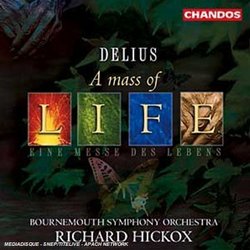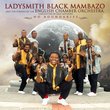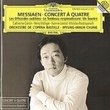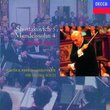| All Artists: Peter Coleman-Wright, Frederick Delius, Richard Hickox, Jean Rigby, Bournemouth Sinfonietta, Joan Rodgers, Rebecca Evans, Nigel Robson Title: Delius: Requiem/A Mass Of Life Members Wishing: 1 Total Copies: 0 Label: Chandos Release Date: 3/18/1997 Genre: Classical Styles: Opera & Classical Vocal, Historical Periods, Early Music, Symphonies Number of Discs: 2 SwapaCD Credits: 2 UPC: 095115951521 |
Search - Peter Coleman-Wright, Frederick Delius, Richard Hickox :: Delius: Requiem/A Mass Of Life
 | Peter Coleman-Wright, Frederick Delius, Richard Hickox Delius: Requiem/A Mass Of Life Genre: Classical
This isn't a mass at all, but a setting of lines from Nietzsche's Also Sprach Zarathustra, including the famous "midnight song" that Mahler stuck into his Third Symphony. Delius clearly intended this piece to be his magnum... more » |
Larger Image |
CD DetailsSynopsis
Amazon.com This isn't a mass at all, but a setting of lines from Nietzsche's Also Sprach Zarathustra, including the famous "midnight song" that Mahler stuck into his Third Symphony. Delius clearly intended this piece to be his magnum opus, and parts of it are mightily impressive indeed, especially the sunrise ending (with pealing bells and gongs). At other times, however, it may seem that the music spends a bit too much time marveling at the coming of the "superman" and not enough time getting on with it. It's a matter of personal taste really, though it's safe to say that if you enjoy Delius, you will want to hear both of these unique works, and this excellent performance won't steer you wrong. --David Hurwitz Similar CDsSimilarly Requested CDs
|
CD ReviewsA wonderful discovery Terry Sanderson | London, England | 01/05/2000 (5 out of 5 stars) "Frederick Delius's music is almost unknown outside of England and this an enormous shame, because it is of the highest quality. The Mass of Life is undoubtedly Delius's great masterwork, on an enormous scale with huge orchestra, gigantic chorus and many soloists. It begins with a huge shout and progresses through some of the most moving and gorgeous passages ever written. It seems incredible to me that it is not as popular as the Mahler 8th - it is certainly better music. However many times I listen to this disc, and listen to it often, I find something new and exciting in the music. Perhaps its neglect is because although it is called a "Mass" it is not in fact religious music - quite the reverse. Delius was an atheist and believed that nature was the paramount force in life. The Requiem whcih is also on this disc is similarly pagan in nature." Agnostic Mass and Requiem Brett A. Kniess | Madison, WI | 01/23/2006 (5 out of 5 stars) "Frederick Delius, sometimes referred to as an English impressionist, is represented here by two large choral/orchestral works, fairly well known: his Requiem and A Mass of Life. It is most interesting that Delius chose two antiquated religious titles for his works, since he himself was an atheist, but more so, the text used is not based on the church's liturgical text, but a text by Friedrich Nietzsche, an anti-Christian philosopher who believed in man, nature, and life. Delius' 30-minute Requiem, a reaction to the horrors of WWI and dedicated to artists that were lost in the war, paraphrases writings of Nietzsche. In five movements, there is a thoughtful evolution of ideas which progress. Movement one lays out the basis of mortality by comparing life to a day; youth represents morning and old-age by evening, and the knowledge of life is lost at the close of day. The second movement begins with proclamations of Hallelujah and the Islamic La, il Allah, but the speaker berates holy exclamations, and urges man to live life to the fullest while he has a chance. The third and fourth movements move to a more personal perspective, the former, a reminiscing of past love, and the latter movement honoring men who lived life, but now have joined Nature. The final movement sets various scenes of living Nature, commenting on the seasons of the year, and incidentally the cycle of life, and a hopeful theme in the renewal of life. The large orchestration, including bass oboe, is complemented by a double chorus, as well as soprano and baritone soloists. The music is not the fuzzy, picturesque landscapes we are used to from Delius, but a more serious garb is donned. Delius, instead, sets moods rather than melodies per se, with occasional dissonances and advanced harmonies. There are also influences of the "English" sound, as well as some "jazzy" chords. There is a real feeling that Delius' beliefs and soul is put into this setting of text, and while the music never really gets angry, he balances the lush sounds of Nature and the revelry of life, with the prospects of mortality. The 98-minute A Mass of Life, as opposed to the Requiem's acknowledgement of the passing of life, celebrates the living of life. With much the same orchestration, a quartet of soloists are called upon here. The text once again is Nietzsche, but the setting is more poetic this go around. The music has much more unbridled energy and optimism compared to the Requiem. The first part of the Mass (there are two parts) is in 5 sections. The first section features a grand opening and march, the second a bouncy solo for baritone, and the third exclaims the revelry of life for soprano, alto, and tenor soloists and chorus; laughing and dancing with neat harmonic and melodic material bursts with optimism. The last two sections touch upon mortality and Delius' settings of nature sink into a peaceful nighttime scene. The second part is in six sections, the outer ones contain boisterous work for full ensemble, while the inner four sections exhibit Delius' pastoral, contemplative, and somewhat impressionistic sounds. Sumptuous harmonies, and in the case of the second section, a Ravel-like wordless chorus dances along. The works' overall musical qualities are more active than the Requiem, in some cases, more tuneful, and certainly more colorful and spry. By far the superior work, A Mass of Life conveys the importance of the individual, having fun, and Nature; the Requiem, a work of hopefulness and remembrance, as well as renewal. The Chandos label sound is full and clear, a sonic delight. The Bournemouth Symphony Orchestra under Richard Hickox casts the many moods Delius asks for with vitality. The soloists are exceptional, including both works' large role for solo baritone; Peter Coleman-Wright is very expressive. The Bournemouth Symphony Chorus and Waynflele Singers handle the difficult choral writing well, the sound is good and I like the forward placement, although the sopranos become a bit shouty in the upper register, but overall well done. These two important large-scale choral/orchestral works are an interesting look at life from a somewhat unpopular viewpoint, but no matter the subject, the music is beautiful and somewhat moving (some think Delius drags on a bit too long). If you want to buy a choral work that is a little different, this might be the CD to look at." More Oratorio than Mass, but grand stuff J. F. Laurson | Washington, DC United States | 12/10/2008 (4 out of 5 stars) "Frederick "Fritz" Delius was popular in Germany long before the English accepted him as a composer of great merit, which wasn't helpful with anti-German sentiment on the rise around World War I. Sir Thomas Beecham's advocacy helped a great deal in securing Delius a foothold on concert programs, although I've not yet had the opportunity to hear some Delius live. The grand Mass of Life - a setting, in German, of Nietzsche's "Also sprach Zarathustra" - might be overly ambitious, but it's grand and wonderful and it ought to be heard. Recordings exist of Beecham, Charles Groves, and for some reason I thought (but can't find or otherwise confirm and am likely mistaken) Simon Rattle. Especially with the latter a figment of my imagination, Hickox is the only modern recording and not just on grounds of sound quality the first choice."
|

 Track Listings (10) - Disc #1
Track Listings (10) - Disc #1




